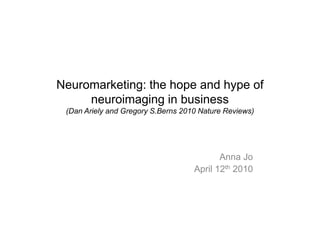Neuromarketing the hope and hype of neuroimaging in business
- 1. Neuromarketing: the hope and hype of neuroimaging in business (Dan Ariely and Gregory S.Berns 2010 Nature Reviews) Anna Jo April 12th 2010
- 2. Why use brain imaging for marketing? Neuromarketing 3 fundamental Question To reveal To provide a To provide hidden more efficient early information cost-benefit information that is not trade-off than about product apparent in other design other marketing approaches research approaches Business Neuroimaging
- 3. Selected marketing research approaches Focus group Preference Simulated choice Market tests questionnaires methods What is measured Open-ended Importance Choices among Decision to buy answers, body weighting for products and choice among language and various product products behaviour; not attributes suitable for statistical analysis Cost and Low cost; risk Moderate cost Moderate High cost and competitive risk comes only from and some risk of cost(higher if high risk of misuses of data alerting using prototypes alerting by the seller competitors instead of competitors, plus descriptions) and the risk of the some risk of product being alerting reverse competitors engineered before launch
- 4. Revealing hidden information Brain activity & Reverse inference & fMRI as a brain recorder Preference measurement Reward mOFC Willingness fMRI to Pay (BOLD (WTP) activity) PFC
- 5. Revealing hidden information Brain activity & Reverse inference & fMRI as a brain recorder Preference measurement Reward ŌĆó Striatal activity correlates with hedonic rating scales => Ventral striatal activity as an indication that an individual likes something ŌĆó Evidence: the posterior probability for a reward process given the observation of nucleus accumbens(NAc) activation(Prior probability of engaging a reward-related process : 0.5) => Based on the number of fMRI papers reported in the BrainMap database with and without ŌĆśrewardŌĆÖ and with and without Nac activation => Nac activation increases the probability of a reward-related processes taking place to 0.9( Bayes factor 9 -> strong evidence for a causal relationship) ŌĆó In real world setting, individual likes something based on Nac activation alone may be substantially less. => Product likeability: significant correlation between Nac activity and product preferences in college students(Knutson et al.)
- 6. Revealing hidden information Brain activity & Reverse inference & fMRI as a brain recorder Preference measurement Reward Value-based decision- making process assignment representation of action Outcome of value to Learning the decisions selection evaluation differenet actions OFC, Striatal Goal-directed action / a read-out of ŌĆślikingŌĆÖ Activity Insula key role in physiological arousal, aversive in nature / a disgust-meter
- 7. Revealing hidden information Brain activity & Reverse inference & fMRI as a brain recorder Preference measurement Reward Multi-voxel Pattern Analysis(MVPA) ŌĆó Advantage: activation in a particular brain region of interest is measured ŌĆó MVPA has the statistical power to predict the individual choices of a subject. ŌĆó For real-world marketing applications, it may be more important to predict future behaviour than to understand the ŌĆśwhyŌĆÖ of behavior
- 8. Costs and Benefits The role of expectation Culture and Advertising Expectation Effect ŌĆó BOLD responses are influenced by ŌĆśexpectationŌĆÖ effects(Pricing effects) ŌĆó mOFC responses were higher when subjects were told that the wine was expensive vs. inexpensive => Activity in this region correlated with self-report ratings of how much participants liked the wine(actually all wines were actually same) => the instantaneous experience of pleasure from a product(Experienced utility) is influenced by pricing and mediating by the mOFC ŌĆó Subjects expectation=> striatal response ŌĆó The reward related signals in the ventral striatum and Nac can be more accurately linked to prediction errors for reward than to reward itself.
- 9. Costs and Benefits The role of expectation Culture and Advertising ŌĆó Coke drinkers showed significant activation in the hippocampus and right dorsolateral PFC when they were cued about the upcoming drink of Coke ŌĆó ŌĆ£reverse inference constraintŌĆØ : Compared brain responses to persons and brands, activation patterns for brands differed from those for people => brands are not perceived in the same way as people. ŌĆó People base many decisions on socio-cultural rules and identities
- 10. Early Product Design Food products ŌĆó perception of flavour -> a multisensory integration process ŌĆó OFC: perceived pleasantness ŌĆó Insula: viscosity and fat content Cf> Drawback: super-heroin of food Political candidates Entertainment ŌĆó 2008 US Presidential ŌĆó Film => cognitive race: $ 1.6 billion synchronizer ŌĆó response to statement Product Development ŌĆó Recall: the strength about candidates => of hippocampal and vm PFC, the anterior Cycle temporal lobe cingulate cortex, the ŌĆó Editing process => posterior cingulate to release the most cortex and the insula profitable movie. Architecture ŌĆó Virtual reality => automobile driving ŌĆó Hippocampal load: when the subject makes navigation decisions but not when they are externally cued
- 12. Conclusion and Future direction 1. Hype: Neuroimaging will be more cost-effective than traditional marketing tool 2. MVPA is able to reveal consumer preferences => to boost post-design sales efforts 3. Neuromarketing 1) to coerce the public into consuming products that they neither need nor want 2) to identify new and exciting products that people want and find useful =>ŌĆØuser designŌĆØ 4. Hope: to foster a more human-compatible design of the products around us












